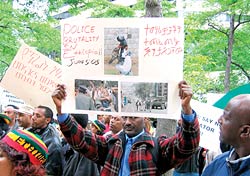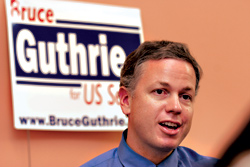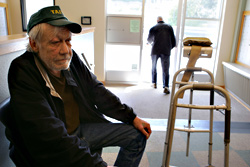The local Ethiopian community numbers 20,000 people, by some estimates, and its members keep a low profile mostly. But when political unrest in Ethiopia took a violent turn last week, they took to the streets on June 8, marching from Capitol Hill to the Henry M. Jackson Federal Building downtown. Chanting in English and Amharic, marchers called on the U.S. government to support democratic reform efforts in the East African country.
Think we have problems with elections here? In an election last month in Ethiopia, the party of longtime Prime Minister Meles Zenawi, accused by Ethiopian exiles of being a dictator, was returned to power, according to official results. But two opposition parties claim that they won a majority of seats in the parliamentary-style election. Last week, students and others began protesting in Ethiopia. Police responded with force, killing dozens of protesters, according to press accounts.
And that’s why Teferi Abay, a Kirkland lighting engineer, was in the streets of Seattle. Like others at the protest, he says the government rigged the election.
“In 3,000 years of [Ethiopian] history, this was the first time people got to vote for the opposition,” he says. Until the 1970s, emperors ruled, and since then a succession of dictators and strongmen have held sway. Most elections in Ethiopia have not been open and competitive.
Abay has lived in the U.S. for five years. He and millions of other Ethiopians went into exile to flee political oppression at home. The Ethiopian population in the U.S. is 500,000, according to the Census Bureau. In the Seattle area, Ethiopians live in the Central District, Capitol Hill, and the Rainier Valley, as well as in Renton. You might encounter them driving cabs or running a small business, but many, Abay says, work as engineers and in other professions.
At the Federal Building, marchers listened to a succession of speeches in Amharic and held signs, some with e-mailed images of the violence at home. One of the speakers was Muluneh Yohannes, a former employee of Ethiopia’s Foreign Ministry. Letters were delivered to the offices of Sens. Patty Murray and Maria Cantwell. They called for support of efforts to pressure Zenawi’s government to accept the will of the Ethiopian people.
The Ethiopian embassy in Washington, D.C., said in a statement on its Web site that opposition parties were engaging in violence and that Zenawi would not give in to “forces of conspiracy.”








